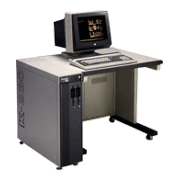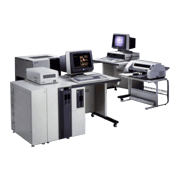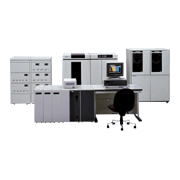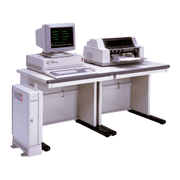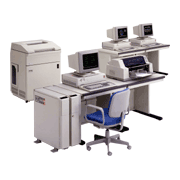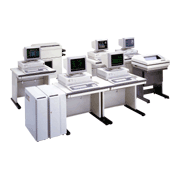The FACOM K Series was an office computer (a small business computer used in an office) from Fujitsu which aimed to integrate the company's FACOM System 80 office computer, and their FACOM V Series (V-830 STREAM, V-830, V-850, V-870) of small computers. The FACOM K Series, with 4 types (FACOM K-10, K-230, K-240 and K-250) and 6 models, was announced as the successor of Fujitsu's FACOM System 80 office computer in May 1984. The higher-end FACOM K-270 and K-280 were announced as successors of the FACOM V Series of small computers in January of the following year, thereby completing the FACOM K Series which aimed to integrate office computers and small computers. The first generation of the FACOM K Series is called the FACOM K-200 Series to distinguish it from the K Series which came later (and continued to the mid 1990s).
The FACOM K-200 Series had the following features.
(1) The series employed the distributed processor system for the first time
-It achieved vertical distributed processing by using the FACOM K-10 (a low-end office computer which could be used as a stand alone) as a high-end work station
-It achieved horizontal distributed processing by enabling connection between FACOM K-270/K-280s and mutual use of data and resources
(2) It integrated small computers (FACOM V Series) and office computers (FACOM System 80) with the UNIOS architecture
(3) It reduced size to 1/4 that of previous types by using larger scale of LSI, 256Kbit DRAM and smaller built-in disks
In May 1986, Fujitsu announced the ten types of the FACOM K Series R Model (9 types in the K-200R Series (K-220R/230R/240R/250R/260R/270R/280R/290R/300R) and the FACOM K-10R desktop office computer (1 type)) which aimed to provide higher performance and greater miniaturization by using 20,000 gate CMOS LSI, higher performance by using high-capacity cache memory, and system enhancements like using the world's first 130MB high-speed compact high-capacity cartridge tape. The top of the line machine, the FACOM K-310R, was added in May 1987, and the series developed further into the FACOM K-600 Series.
Table 1 gives the main specifications for the FACOM K-200 Series, and Table 2 gives the main specifications for the FACOM K-200 Series R Model.
| Type name | K-230S, K-230 |
K-240 | K-250, K-250L |
K-270 | K-280 | |
|---|---|---|---|---|---|---|
| Announcement date |
May 1984 | January 1985 | ||||
| Positioning | Low-end office computer, Successor of FACOM System 80 Series | High-end office computer, Successor of small FACOM V Series | ||||
| CPU | 16bit CMOS LSI processor FSSP | Same as at left + Attached processor (AIPU) | 16bit CMOS LSI processor FSSP and functionally-distributed multiprocessor using 32bit IPU | |||
| Main memory | Memory device | 256Kbit dynamic RAM | ||||
| Capacity (MB) | 0.5-1 | 0.5-2 | K-250:1-3 K-250L:1-4 |
1-7.75 | 2-9 | |
| Max. built-in disk capacity | K-230S: 20MBx2 K-230: 43MBx2 |
68MBx3 | K-250: 134MBx3 K-250L: 134MBx5 |
1.0GB | 3.3GB | |
| Max. number of connected work stations | 2 | 4 | K-250:8 K-250L:16 |
28 | 56 | |
| Features |
|
|
||||
(Note) The above specifications are from the time of announcement, and may have been changed due to later improvement.
| Type name | K- 220R |
K- 230R |
K- 240R |
K- 250R |
K- 260R |
K- 270R |
K- 280R |
K- 290R |
K- 300R |
K- 310R |
|---|---|---|---|---|---|---|---|---|---|---|
| Date of announ- cement |
May 1986 (May 1987 for the K-310R) | |||||||||
| Positioning | Low-end office computer, Successor of the K-200 Series low-end machines | High-end office computer, Successor of the K-200 Series high-end machines | ||||||||
| CPU | 16bit CMOS LSI processor FSSPII | 16bit CMOS LSI processor FSSPII and functionally-distributed multiprocessor using 32bit IPU, types other than K-290R equipped with high-capacity 64KB cache memory | ||||||||
| Main memory capacity (MB) | 1-2 | 1-2 | 1-4 | 1-5 | 2-7 | 1-5 | 2-8 | 3-11 | 3-15 | 7-31 |
| Max. built-in disk capacity | 129 MB |
204 MB |
348 MB |
650 MB |
1 GB |
650 MB |
1 GB |
2.3 GB |
4.2 GB |
7.1 GB |
| Max. number of connected work stations | 2/4 | 4 | 10 | 20 | 28 | 16 | 28 | 56 | 112 | |
(Note) The above specifications are from the time of announcement, and may have been changed due to later improvement.


